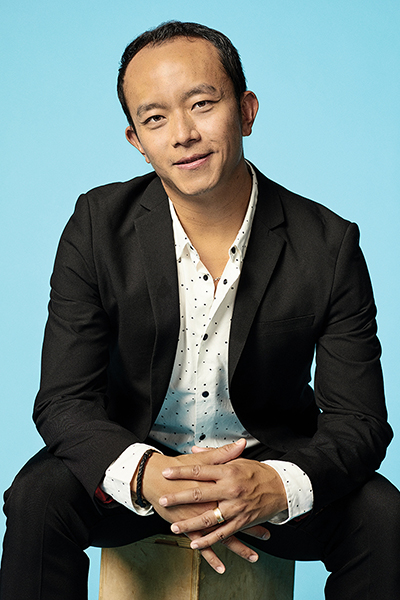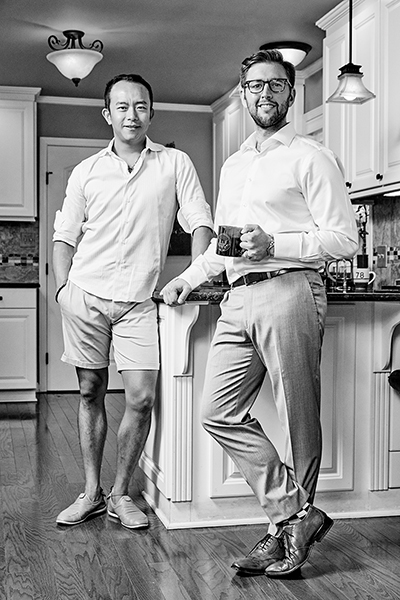Dance of life
Ma Cong’s American Dream
Ma Cong and Thomas Landrum
Adam Murphy
When Ma Cong, the resident choreographer of Tulsa Ballet, was three years old, he performed his own version of the “Dying Swan” ballet in front of 3,000 people in his hometown of Beijing.
After creating more than two dozen ballets over the last 13 years, he will make his Broadway debut as choreographer for Julie Taymor’s new production of “M. Butterfly” in October.
This month, he becomes a U.S. citizen. And in January of next year, just after their first wedding anniversary, he and his husband, lawyer Thomas Landrum, will welcome twin boys.
An unlikely journey? Not any more so than the journeys on which he takes dancers and audiences across the world. His ballets are swirls of passion, linking classical Western and Chinese dance with contemporary forms in gravity-warping lifts and intricate turns that pack an emotional punch as they play on the edges of the laws of physics. For Cong, the improbable is the everyday.
During his two decades in the States, Cong has built a distinctly 21st-century version of the American dream: a mixed-ethnicity marriage with a same-sex partner who also has a demanding, flourishing career; a loving family that’s growing with the help of surrogacy; and a goal of paying it forward into a future that’s more open and welcoming for all.
“Ma lives and acts,” Landrum said, “exactly as he dances and creates: full-hearted and completely honest, giving 110 percent at all times.”
 “We all remember his first season with the company,” said Marcello Angelini, the Tulsa Ballet artistic director who hired Cong from the National Ballet of China and became one of his strongest supporters. “We saw his ability to communicate with us, in spite of hardly speaking any English, his energy in the studio and his eagerness to take in as much as possible from this new culture. And he did that while being securely anchored in his own tradition.”
“We all remember his first season with the company,” said Marcello Angelini, the Tulsa Ballet artistic director who hired Cong from the National Ballet of China and became one of his strongest supporters. “We saw his ability to communicate with us, in spite of hardly speaking any English, his energy in the studio and his eagerness to take in as much as possible from this new culture. And he did that while being securely anchored in his own tradition.”
Did he have any training in making dances? “No,” Cong said with a rueful laugh. “I have always been a free spirit. My mom was always telling me I’d become a choreographer. It was like fate, or destiny.”
Angelini invited him to choreograph for Tulsa Ballet, and commissions from other companies followed, as did awards in competitions and recognition as one of “25 to watch” from Dance Magazine. He retired from performing in 2013.
Cong comes from what Landrum described as a forward-thinking, industrious, entrepreneurially-minded family, and success came to him quickly.
“But I always struggled with one thing,” Cong said. “I didn’t know whether I would be able to have a personal life. People would tell me they didn’t think I could find someone here in Oklahoma, because people are maybe not so open yet, especially when they know your name.
“I thought I would probably just end up by myself. Until 2011, when I met Thomas, and life changed. As soon as I met him I just knew that he was the right person to share my life with.”
 Born in Edmond and raised in Owasso, Landrum grew up showing Brahmin cattle and taking creative literature classes in school. He saw Cong for the first time in a Tulsa Ballet educational outreach performance during Cong’s first year in the company, but they didn’t meet until 2011, when Landrum was in his third year of law school at the University of Tulsa.
Born in Edmond and raised in Owasso, Landrum grew up showing Brahmin cattle and taking creative literature classes in school. He saw Cong for the first time in a Tulsa Ballet educational outreach performance during Cong’s first year in the company, but they didn’t meet until 2011, when Landrum was in his third year of law school at the University of Tulsa.
“The first time we met, at Shades of Brown, we talked for three and a half hours,” Landrum said. “Truthfully, we’ve been together ever since.”
Within only a few years of passing the bar, Landrum was made partner and business manager at The Firm on Baltimore, where he specializes in family law and does charity work for Tulsa Lawyers for Children. He is also active on the board of Tulsa Ballet. During our interview, the two men repeatedly lifted up each other’s achievements in preference to discussing their own.
In 2012, he helped Cong through the difficult loss of his mother in China, with whom he had spoken via FaceTime more than once.
“His mom knew no English but she was so enthusiastic, warm, and welcoming,” Landrum said.
“I didn’t want to choreograph, I didn’t want to dance,” Cong remembered. “My body and mind just shut down. But Thomas was so kind to me. Life is always like waves. When you have the deepest moment, you start to climb again.”
That moment was a turning point for both of them.
“When you get into a real healthy relationship and get support at home as well as at work,” Landrum said, “it changes things. We gave each other permission to just dive all in.
“Ma certainly taught me how to do that. You don’t dangle your feet in the water. If you’re going to fall, you’re going to fall running.” He laughed. “Not that he’s ever done that.”
Cong and Landrum were together for six years before marrying in January.
“The arts community has been very welcoming, very loving,” Landrum said. “It may be that they don’t approve of our relationship, but that’s never been expressed. We’re all there because we love beautiful art and that’s really what it comes down to. That’s the way it is in the professional legal realm. If you do a good job, you work hard, and you represent your clients, I’ve never been held accountable overtly for other people’s lack of approval.”
That doesn’t mean the road is always easy. Landrum recalled overhearing a group of businessmen speaking negatively (as they got progressively drunker) about homosexuality in a restaurant where he and his mother were having dinner back in June.
“She’s a traditional Oklahoman—my parents met on an oil derrick, actually—so she’s had to make significant progress in the way she feels and thinks about our relationship. I know she was conflicted, hearing them talk. It crushed me. I just bought them a bottle of wine, introduced myself, and wished them a happy Pride month.
“I came home and was so torn. What if it had been a 17-year-old kid who was listening? I said to Ma, ‘We need to join a board, we need to mentor.’ Ma said, in all his brilliance, that the best thing we could do is just be good people and raise a great family. Set an example. I was like—oh, right! And all the clouds disappeared.”
There are many same-sex couples starting families, mainly through adoption or fostering; Cong and Landrum join them as part of a smaller population using a surrogate. There are no statistics on same-sex surrogacy yet, but a few clinics around the country exist to help guide couples through the complex and expensive process.
“The way we are doing it, even if you were a straight couple it would be difficult,” Landrum said.
They found an egg donor, then Surrogacy Solutions clinic in Dallas found them a surrogate—of whom they speak affectionately as already, and permanently, part of their family. She’s carrying twin boys: one with Landrum’s DNA, the other with Cong’s.
 “We’ve been very blessed through this process, and we cannot wait to raise these babies in Oklahoma,” Cong said. “I believe people here are transitioning to knowing that this is really just love. We can raise beautiful babies, provide a great life, great education, and they will be a great support to the country. This is what we want to do, just like other same-sex couples. I hope that Oklahoma will be able to support journeys like ours.”
“We’ve been very blessed through this process, and we cannot wait to raise these babies in Oklahoma,” Cong said. “I believe people here are transitioning to knowing that this is really just love. We can raise beautiful babies, provide a great life, great education, and they will be a great support to the country. This is what we want to do, just like other same-sex couples. I hope that Oklahoma will be able to support journeys like ours.”
“Right now in Oklahoma, we would have to cross-adopt the children who are not biologically ours, which of course we would be happy to do,” Landrum continued, “but really, we are married. We’d love to help the community understand that a healthy and happy family doesn’t have to look a certain way, that maybe some of the ceremonial barriers put up to having a family aren’t worth the harm they create.”
“The highlight of almost 20 years of knowing Ma,” Angelini said, “was attending his wedding ceremony and witnessing how happy he was in that moment, finally marrying Thomas. Yes, they are a somewhat non-traditional family, but I bet my retirement income that they will be together for the rest of their lives. They need a bit of a help having children. I know many couples who do. We have a lot to learn from relationships like that of Ma and Thomas, as they can teach us what love is and the true reasons why we should say ‘I do.’”
For Cong, it’s been an incredible journey. Gaining U.S. citizenship is just another step in this dance.
“Plus, I get to vote,” he said, grinning.
“We’re living in America,” he said. “It’s about all of us. It’s because of other people that we have this. It’s all connected for something good.
“This was my dream, and it all came true.”


.jpg)
.jpg)
